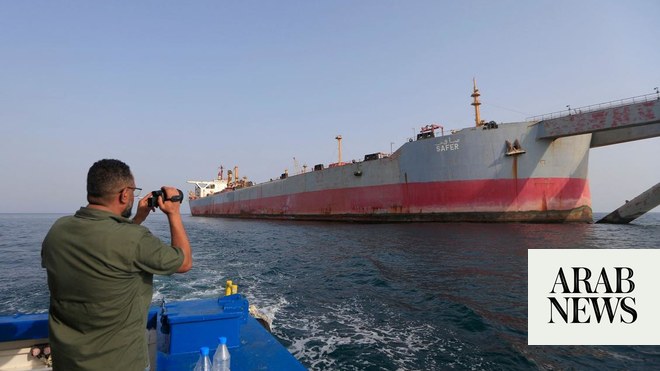
Recent images showing water leaking into the decaying Safer tanker off the Yemeni western city of Hodeidah have triggered international uproar
Diplomats warned that the tanker’s cargo would cause a major disaster in the Red Sea if the tanker collapsed
AL-MUKALLA: Members of the Security Council on Friday called on the Iran-backed Houthis to immediately give access to UN experts to the decaying Safer tanker in the Red Sea.
“The members of the Security Council recognized the grave threat posed by the Safer oil tanker, whose dire and dilapidated condition risks an environmental, economic and humanitarian catastrophe to Yemen and the region, and they called on the Houthis to urgently facilitate unconditional and safe access for UN experts to conduct an assessment and repair mission,” the members said in a joint statement.
“They welcomed the recent contributions made by Saudi Arabia, the UK, Germany, the Netherlands and France, and the mobilization of the Peace Support Facility,” the statement said thanking the countries that pledged to fund the maintenance mission.
Recent images showing water leaking into the decaying Safer tanker off the Yemeni western city of Hodeidah have triggered international uproar as environmentalists and diplomats warned that the tanker’s cargo of more than 1 million barrels of crude oil would cause a major disaster in the Red Sea if the tanker collapsed. Other experts say that a stray shell from nearby battlefields would cause an explosion more powerful than the one that rocked Beirut in August.
The Houthis have blocked vital maintenance of the tanker since 2015 and insisted on including experts from countries that did not back the Arab coalition’s military operation in the committee that could inspect the tanker.
The US has called on the Houthis to smooth the way for the UN experts to visit the tanker. “We also call for unconditional access for the UN experts to assess and repair the Safer tanker, which threatens the Red Sea and people of Yemen with catastrophic consequences, including environmental and economic damage and a severe reduction of food and aid imports,” Kelly Craft, US ambassador to the UN, said at a UN Security Council briefing on the situation in Yemen.
Yemen’s government promised to facilitate the mission of the UN experts, urging the international community to mount more pressure on the Houthis not to politicize the oil tanker. “With regard to the Safer oil tanker, the government of Yemen calls on the Security Council to assume its responsibilities and pressure the Houthis to stop politicizing the issue and immediately allow the UN teams access to the tanker to undertake assessment and repair works to avert an imminent catastrophe,” Abdullah Al-Saadi, Yemen’s permanent representative at the UN said.
The Security Council expressed its “steadfast” support for the UN Yemen envoy Martin Griffiths and called upon warring factions in Yemen to accept the UN-initiated Joint Declaration.
Inspired by the latest successful prisoner swap between the legitimate government and the Houthis, veteran former diplomats and current government officials believe that only direct talks will lead to a truce and address thorny issues.
“Prisoner swap talks succeeded only because Yemenis engaged in direct talks. They quarelled at the beginning of the talks, but they reached a consensus by the end of the day,” a senior government official said. “So I suggest calling for direct talks before anything else.”
Majed Fadhail, deputy minister of human rights and a member of the government delegation in the prisoner swap talks in Switzerland, agreed that talks succeeded when they and the Houthis met face to face.
Abu Bakr Al-Qirbi, Yemen’s former foreign minister, said that recent prisoner swap has rekindled hopes for a comprehensive agreement that would end the war. “The (UN) envoy should immediately call the parties to direct negotiations on the Joint Declaration document, as it is the most effective and shortest way to consensus,” he tweeted.
The conflict in Yemen began in late 2014 when the Houthis seized control of the Yemeni capital, Sanaa, and subsequently expanded across Yemen. The war has killed more than 100,000 people and caused the world’s worst humanitarian crisis, according to the UN.











